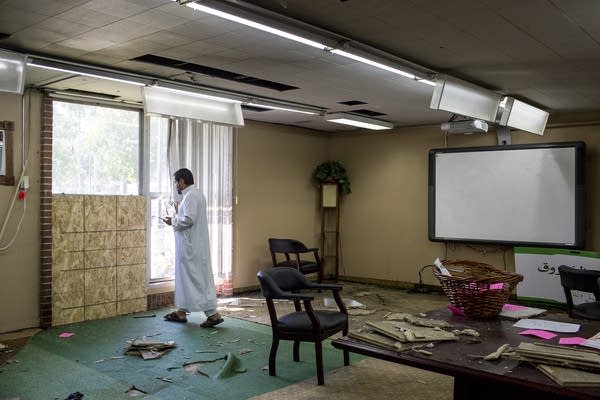Use of 'terrorism' label depends on questions of rhetoric, law

After a man used his car to mow down a group of counter-protesters at a white supremacist rally in Virginia, many are asking: What constitutes an act of terrorism?
As it turns out, "terrorism" — at least in reference to domestic acts — is an ill-defined term. But it's still a powerful label, with symbolic heft.
President Trump faced withering criticism for his initial response to the deadly car attack. While many Americans waited for him to come out with a stronger denunciation of white supremacists, his national security adviser was quick to call the incident a form of terrorism.
"What terrorism is, is the use of violence to incite terror and fear," said Gen. H.R. McMaster on "Meet the Press" the morning after the attack. "And of course it was terrorism."
Create a More Connected Minnesota
MPR News is your trusted resource for the news you need. With your support, MPR News brings accessible, courageous journalism and authentic conversation to everyone - free of paywalls and barriers. Your gift makes a difference.
Attorney General Jeff Sessions also denounced the Charlottesville attack as an "evil" act of domestic terrorism.
But people who have studied terrorism say use of the word is politicized and subjective.
"Terrorism really is an almost meaningless term," said Ruth DeFoster, a communications studies professor at St. Catherine University in St. Paul. The question of why some acts of violence are considered terrorism and others are not intrigued her so much that she wrote a book about it.
DeFoster said there's no consensus on what terrorism is. "You'd be hard pressed to find any two law enforcement officials, law enforcement entities, any two policymakers, any two journalists who are going to define terrorism the same way," she said. "That's the problem."
A native New Yorker, DeFoster was 16 at the time of the Sept. 11 attacks. Ever since then, she said, Americans have had a racially influenced idea of who terrorists are. And their biases are reflected in the media.

"What I've found in my research, over and over, is that Muslim, Arab and Middle Eastern subjects are almost uniformly identified as terrorists," she said, "while subjects who are not Middle Eastern, Muslim or Arab are rarely identified as terrorists in media coverage."
She said two recent mass shootings illustrate the inconsistencies. In 2015, Dylann Roof gunned down nine people at a black church in Charleston, S.C. One year later, Omar Mateen killed 49 in a gay nightclub in Orlando, Fla.

Journalists depicted Mateen's act as a much graver threat to national security, DeFoster said. And that's peculiar, given how much he had in common with Roof.
"They're both young men, they're both mentally ill, they both have a long history of substance addiction, they both self-radicalized online," she explained. "But overwhelmingly, Omar Mateen was described as a terrorist, and his crime was seen as being emblematic of this broader danger, while Dylann Roof was framed as a deranged lunatic, a one-off, someone who wasn't representative of anything broader than himself."
But even when law enforcement officials call a violent act in this country a form of terrorism, it's largely symbolic. That's because while there are terrorism-related criminal statutes on the books, they apply to international terrorism. Domestic terrorism is not in itself a criminal offense that can be prosecuted.
The federal Patriot Act defines domestic terrorism as an act "dangerous to human life" in violation of the law and is intended to intimidate or coerce a civilian population or influence government policy. But the U.S. State Department and Defense Department each has its own, separate definition of terrorism.
So why does it matter what it's called?
When someone set off a bomb at a Bloomington mosque earlier this month, many Somali-American worshipers absolutely called it terrorism. They wanted to hear the media, and law enforcement, say as much.

Mike German, a fellow at the Brennan Center for Justice at New York University School of Law and a former FBI agent, said that when law enforcement uses the term "terrorism" in some instances but not others, it creates a sense of a two-tiered system of justice. It leads minority communities to feel as though they're less protected, he said.
"I think it's silly that the government isn't willing to use the word, like that word has some magic," German said. "This was intended to terrorize the Muslim community. A bombing at a mosque, of course, is going to do that. And even if the motive turns out to be less clear, the effect today is that the community is in fear."
While he's critical of the rhetoric, German said he has faith in the investigation. FBI officials say they're exhausting numerous resources to get to the bottom of the mosque bombing — no matter what they call it.
Clarification (Aug. 16, 2017): The photo caption in this story has been updated to reflect that a man plowed his car into the crowd of counter-protesters. The original caption referred to it as an accident.